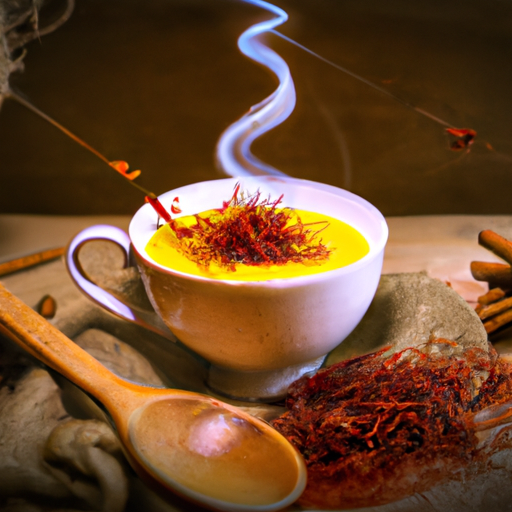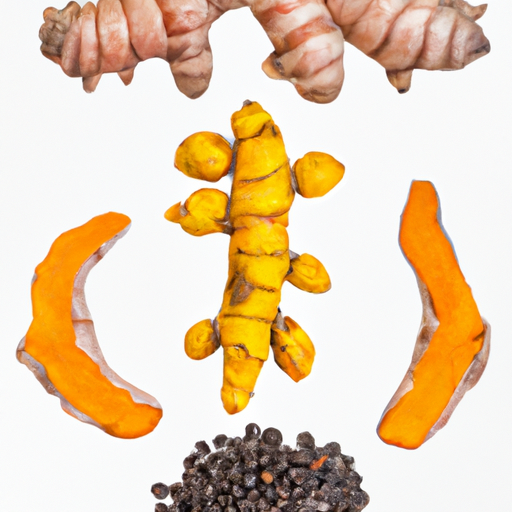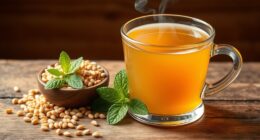Did you know that ginger and turmeric, when combined, can offer a powerful boost to your overall health? It’s true! In fact, research shows that these two spices have been used for centuries in traditional medicine for their potent anti-inflammatory and antioxidant properties.
When consumed together as a tea, ginger and turmeric can provide numerous health benefits, including improved digestion, reduced inflammation, and enhanced immune function.
But how do you brew the perfect cup of ginger and turmeric tea? And are there any potential risks or side effects to be aware of?
In this article, I will explore the health benefits of ginger and turmeric, provide a step-by-step guide on brewing the perfect cup of tea, discuss potential risks and side effects, and offer alternative ways to incorporate these spices into your diet. Additionally, I will delve into the latest research and studies on the health benefits of ginger and turmeric, and even share personal stories and testimonials.
So, grab your teapot and let’s dive in to discover the amazing benefits of ginger and turmeric tea!
Key Takeaways
- Consuming ginger and turmeric tea can improve digestion, reduce inflammation, and enhance immune function.
- It is generally safe to consume 1-2 cups of ginger and turmeric tea per day, but it is best to consult a healthcare professional if there are underlying medical conditions or medications.
- Potential risks and side effects of consuming ginger and turmeric tea include allergies, sensitivities, interactions with medications, and the importance of moderation.
- Ginger and turmeric have been used in traditional medicine for centuries for their health benefits.
Health Benefits of Ginger and Turmeric
Combining the fiery warmth of ginger with the golden hues of turmeric creates a soothing elixir that blankets your body in a wave of healing and vitality. Both ginger and turmeric have been used for centuries in traditional medicine for their numerous health benefits.
Ginger is well-known for its anti-inflammatory properties, which can help reduce pain and inflammation in the body. Turmeric, on the other hand, contains a compound called curcumin, which has powerful antioxidant and anti-inflammatory effects.
When it comes to brewing techniques, it’s best to use fresh ginger and turmeric roots rather than powdered forms, as they contain more active compounds. Start by peeling and grating the ginger and turmeric roots. Then, bring a pot of water to a boil and add the grated roots. Let it simmer for about 10 minutes to allow the flavors to infuse into the water. Strain the tea and add a squeeze of lemon or a touch of honey for extra flavor.
As for the recommended dosage, it’s generally safe to consume 1-2 cups of ginger and turmeric tea per day. However, it’s always best to consult with a healthcare professional, especially if you have any underlying medical conditions or are taking medications that may interact with these herbs.
Brewing the perfect cup of ginger and turmeric tea is not only a delightful experience but also a way to reap the health benefits of these two powerful herbs.
Brewing the Perfect Cup of Ginger and Turmeric Tea
Brewing the perfect cup of this aromatic and vibrant blend is an art that can transport you to a blissful state of relaxation. To achieve the optimal flavor and health benefits from ginger and turmeric tea, it’s important to use the right brewing techniques and choose the best tea brands.
When preparing ginger and turmeric tea, start by boiling water in a kettle. While the water’s heating up, peel and slice fresh ginger and turmeric root. Once the water reaches a rolling boil, add the ginger and turmeric slices and let them steep for about 10 minutes. This’ll allow the flavors and medicinal compounds to infuse into the water, creating a robust and soothing brew.
To enhance the taste, you can add a squeeze of lemon juice or a drizzle of honey. It’s also worth noting that using high-quality tea brands can make a significant difference in the overall experience. Look for brands that source organic ingredients and have a reputation for producing flavorful and potent teas.
Brewing the perfect cup of ginger and turmeric tea can be a delightful and therapeutic experience. However, it’s essential to note that there may be potential risks and side effects associated with consuming large amounts of ginger and turmeric. Therefore, it’s important to be aware of these potential risks before incorporating this tea into your daily routine.
Potential Risks and Side Effects
When considering the potential risks and side effects of consuming ginger and turmeric tea, it’s important to be aware of a few key points.
Firstly, individuals with allergies or sensitivities to these spices should exercise caution, as they may experience adverse reactions.
Secondly, it’s crucial to be mindful of any medications you may be taking, as ginger and turmeric can interact with certain drugs.
Lastly, moderation is key when consuming ginger and turmeric tea, and it’s recommended to adhere to the recommended daily intake to avoid any potential negative effects.
Allergies and sensitivities
If you’re not careful, ginger and turmeric together as tea could unleash a torrent of allergies and sensitivities that’ll make your immune system throw a wild tantrum. While these ingredients are generally safe and well-tolerated, it’s important to be aware of potential risks and side effects, especially if you’ve got a history of allergies or sensitivities.
Here are five things to keep in mind:
-
Allergic reactions: Some individuals may be allergic to ginger or turmeric, leading to symptoms like hives, itching, or difficulty breathing.
-
Cross-reactivity: If you’re allergic to one of these spices, there’s a possibility of cross-reactivity with the other.
-
Sensitivities: Even if you’re not allergic, ginger and turmeric can still cause sensitivities in some people, resulting in digestive upset or skin irritation.
-
Interactions with medications: Ginger and turmeric may interact with certain medications, so it’s important to consult with a healthcare professional if you’re taking any prescription drugs.
-
Purity and quality: Ensure you’re using high-quality, pure ginger and turmeric to minimize the risk of contaminants or adulterants.
Understanding these potential risks and side effects will help you enjoy your ginger and turmeric tea safely.
Now, let’s delve into the next section about interactions with medications.
Interactions with medications
To ensure your safety, it’s crucial to be aware of how medications may interact with the potent properties of ginger and turmeric. Both ginger and turmeric are known for their potential interactions with herbal remedies and medications. These herbs can affect the liver’s ability to metabolize certain drugs, leading to either increased or decreased effectiveness.
For example, ginger may interact with blood thinners, such as warfarin, increasing the risk of bleeding. Turmeric, on the other hand, has been found to enhance the effects of certain medications, such as anti-inflammatory drugs. It’s important to consult with your healthcare provider before combining ginger, turmeric, or any other herbal remedies with your medications. They can provide personalized advice based on your specific situation.
Moving forward, let’s discuss moderation and recommended daily intake to ensure the best results.
Moderation and recommended daily intake
Although it may seem tempting to consume copious amounts of these powerful herbs, it’s crucial to exercise moderation and adhere to the recommended daily intake for optimal benefits.
Both ginger and turmeric have numerous health benefits, but taking excessive amounts can lead to unwanted side effects. The recommended dosage for ginger is up to 4 grams per day, while turmeric is safe to consume up to 3 grams daily. It’s important to note that these recommendations may vary depending on factors such as individual health conditions and medications being taken.
Additionally, it’s crucial to be aware of potential interactions with medications, as both ginger and turmeric can interact with certain drugs. To ensure safety and effectiveness, it’s always best to consult with a healthcare professional before incorporating ginger and turmeric into your daily routine.
Transitioning into the next section, let’s explore other ways to incorporate ginger and turmeric into your diet.
Other Ways to Incorporate Ginger and Turmeric into Your Diet
When it comes to incorporating ginger and turmeric into your diet, there are several options to choose from. One way is to add them to smoothies or juices, which not only enhances the flavor but also provides a dose of their beneficial properties.
Another option is to use them in cooking and baking, as these spices can elevate the taste and nutritional value of your meals.
Lastly, for those who prefer a more convenient option, trying ginger and turmeric supplements can be a practical way to reap their health benefits.
Adding them to smoothies or juices
Adding ginger and turmeric to smoothies or juices creates a flavorful and healthy blend. Not only do these spices add a unique taste to your drink, but they also provide numerous health benefits.
Both ginger and turmeric have anti-inflammatory properties and are rich in antioxidants. Consuming them together can help reduce inflammation in the body and boost the immune system. Ginger is known for its ability to aid digestion and relieve nausea, while turmeric has been shown to have potential anti-cancer properties.
To incorporate these spices into your smoothies or juices, simply add a teaspoon of grated ginger and a teaspoon of turmeric powder to your favorite recipe. Blend everything together and enjoy the refreshing and nutritious drink.
In the next section, we’ll explore how you can use ginger and turmeric in cooking and baking to enhance your meals.
Using them in cooking and baking
One of the best ways to incorporate the health benefits of ginger and turmeric into your meals is by using them in cooking and baking. These versatile spices not only add a burst of flavor to your dishes but also provide numerous health benefits. Here are three cooking techniques to try with ginger and turmeric:
-
Sautéing: Heat a small amount of oil in a pan and add finely chopped ginger and turmeric. Sauté them for a few minutes until fragrant, then add your desired vegetables or protein for a flavorful stir-fry.
-
Roasting: Toss sliced ginger and turmeric with your favorite vegetables and roast them in the oven. The combination of spices will infuse a warm and earthy flavor into the veggies, making them irresistible.
-
Marinating: Create a marinade by blending ginger, turmeric, garlic, and other spices with yogurt or coconut milk. Coat your meat or tofu with this flavorful mixture and let it sit for a few hours before grilling or baking.
Incorporating ginger and turmeric into your cooking not only enhances the taste of your meals but also boosts their nutritional value. Now, let’s explore the option of trying ginger and turmeric supplements.
Trying ginger and turmeric supplements
If you’re looking to boost your health in an easy and convenient way, why not give ginger and turmeric supplements a try? These supplements can be a great alternative to using fresh ingredients in cooking or making tea.
One of the benefits of taking ginger and turmeric supplements is that they’re available in different tea blends, allowing you to try out different flavors and find the one that suits your taste buds. Additionally, there are various brands of ginger and turmeric supplements on the market, so you can compare their ingredients and choose the one that meets your specific needs.
As we delve into the subsequent section about research and studies on ginger and turmeric’s health benefits, it’s important to explore all the options available, including supplements, to maximize the potential benefits of these powerful ingredients.
Research and Studies on Ginger and Turmeric’s Health Benefits
When it comes to ginger and turmeric, there’s a wealth of scientific evidence supporting their anti-inflammatory effects. Numerous studies have shown that both spices have the ability to reduce inflammation in the body, which can be beneficial for those with conditions such as arthritis or chronic pain.
Additionally, research has also indicated that ginger and turmeric have digestive health benefits, with the potential to relieve symptoms of indigestion and improve overall gut health.
Lastly, these spices have been found to support the immune system. Studies suggest that they may help boost immune function and reduce the risk of infections.
Scientific evidence on anti-inflammatory effects
Combine ginger and turmeric in your tea for a powerful anti-inflammatory effect that can help reduce pain and inflammation in your body. Both ginger and turmeric have been extensively studied for their anti-inflammatory properties, and research evidence supports their use in managing various inflammatory conditions. Ginger contains compounds called gingerols, which have been shown to inhibit the production of inflammatory substances in the body. Turmeric, on the other hand, contains curcumin, a potent anti-inflammatory compound that can block the activity of inflammatory enzymes. When consumed together, ginger and turmeric can have a synergistic effect, enhancing their anti-inflammatory properties.
To emphasize the anti-inflammatory benefits of ginger and turmeric, consider the following table:
| Ginger | Turmeric |
|---|---|
| Contains gingerols that inhibit inflammation | Contains curcumin, a potent anti-inflammatory compound |
| Reduces pain and inflammation in the body | Blocks the activity of inflammatory enzymes |
Incorporating ginger and turmeric into your tea is a simple and natural way to harness their anti-inflammatory effects. In the next section, we will explore studies on the digestive health benefits of these powerful spices.
Studies on digestive health benefits
Research has shown that incorporating ginger and turmeric into your diet can have significant digestive health benefits. Both ginger and turmeric have been found to possess anti-inflammatory properties, which can help alleviate digestive issues such as bloating, gas, and indigestion.
Ginger has been used for centuries to treat various gastrointestinal problems, including nausea and vomiting. It can also stimulate the production of digestive enzymes, aiding in the breakdown of food and improving overall digestion.
Turmeric, on the other hand, contains a compound called curcumin, which has been shown to reduce inflammation in the gut and promote the growth of beneficial gut bacteria. By including ginger and turmeric in your diet, you may experience improved digestion and a reduction in digestive discomfort.
Moving on to the next section about research on immune system support, it is worth exploring the potential benefits of these spices beyond digestive health.
Research on immune system support
If you’re looking to boost your immune system, incorporating these two spices into your daily routine can make a significant difference. Ginger and turmeric have been researched for their immune system boosting properties and are commonly used as natural remedies. Studies have shown that ginger has antimicrobial and anti-inflammatory effects, which can help enhance the immune response. Turmeric, on the other hand, contains curcumin, a compound known for its antioxidant and anti-inflammatory properties that can support immune function.
To give you a clearer picture, here is a table summarizing some of the research on the immune system support provided by ginger and turmeric:
| Spice | Immune System Benefits |
|---|---|
| Ginger | – Enhances immune response |
| – Exhibits antimicrobial properties | |
| – Reduces inflammation | |
| Turmeric | – Supports immune function |
| – Contains antioxidants to combat oxidative stress | |
| – Has anti-inflammatory effects to promote immune health |
Incorporating ginger and turmeric into your diet, such as through tea, can provide natural immune system support. This evidence-based information can help you make informed decisions about your health. In the next section, we will explore personal stories and testimonials from individuals who have experienced the benefits of these spices firsthand.
Personal Stories and Testimonials
In my personal experience, drinking ginger and turmeric tea has been a game-changer for my health and well-being. I’ve noticed a significant improvement in my digestion and overall immune system since incorporating this tea into my daily routine.
Additionally, I’ve come across numerous success stories from others who’ve experienced similar benefits. They’ve reported reduced inflammation and increased energy levels. If you’re considering trying ginger and turmeric tea, I’d highly recommend it. I suggest seeking advice and tips from fellow tea enthusiasts who’ve already incorporated it into their lives.
Individuals’ experiences with ginger and turmeric tea
When sipping on a comforting cup of ginger and turmeric tea, I’ve experienced the health benefits and soothing effects it provides.
The brewing process is simple and can be done by adding grated ginger and turmeric powder to boiling water and letting it steep for about 10 minutes.
Ginger and turmeric are both known for their anti-inflammatory properties, which can help reduce inflammation in the body and relieve symptoms of arthritis. Additionally, ginger has been shown to aid digestion and relieve nausea, while turmeric contains a compound called curcumin that has antioxidant and anti-cancer effects.
The combination of these two powerful spices creates a warm and comforting beverage that not only tastes delicious but also provides numerous health benefits.
Transitioning into the subsequent section, many individuals have shared success stories of improved health and well-being after incorporating ginger and turmeric tea into their daily routine.
Success stories of improved health and well-being
Experience the incredible success stories of individuals who’ve seen remarkable improvements in their health and overall well-being by incorporating the powerful combination of ginger and turmeric into their daily routine.
-
Improved Sleep: Many individuals have reported experiencing better quality sleep after regularly consuming ginger and turmeric tea. The calming properties of these herbs help relax the mind and body, promoting a more restful night’s sleep.
-
Increased Energy: Another common benefit reported by ginger and turmeric tea enthusiasts is an increase in energy levels. These herbs are known for their ability to boost metabolism and improve circulation, providing a natural and sustained energy boost throughout the day.
-
Enhanced Mood: Ginger and turmeric have been shown to have mood-enhancing properties. Many individuals have reported feeling happier and more positive after incorporating this tea into their daily routine.
-
Reduced Inflammation: Both ginger and turmeric are well-known for their anti-inflammatory properties. Regular consumption of ginger and turmeric tea has been associated with reduced inflammation in the body, leading to improved overall health and well-being.
These success stories demonstrate the potential benefits of adding ginger and turmeric tea to your daily routine. Now, let’s explore some tips and advice from tea enthusiasts to enhance your tea-drinking experience.
Tips and advice from tea enthusiasts
Discover the wisdom and insights shared by tea enthusiasts to elevate your enjoyment of this powerful combination and unlock the full potential of this incredible herbal blend.
When it comes to preparing ginger and turmeric tea, there are a few tips and tricks that can enhance your experience. First, always use fresh ginger and turmeric roots for the best flavor and health benefits. Grate or slice them thinly before adding them to boiling water. To maximize the extraction of their active compounds, simmer the tea for at least 10 minutes.
For added depth of flavor, consider adding a squeeze of lemon or a dash of honey. Experiment with different ratios and brewing times to find the perfect balance that suits your taste.
Now, let’s delve into the conclusion and final thoughts on this wonderful tea combination.
Conclusion and Final Thoughts
To wrap it all up, you should definitely give the combination of ginger and turmeric a try in your tea—it’s like a soothing blend of flavors that’ll transport your taste buds to a tropical paradise.
Not only does this dynamic duo add a delicious kick to your tea, but it also offers a wide range of health benefits.
From personal anecdotes to expert opinions, tea enthusiasts have praised the combination of ginger and turmeric for its numerous health benefits. Both ginger and turmeric are known for their anti-inflammatory properties, which can help reduce pain and inflammation in the body. Additionally, ginger has been shown to aid in digestion and relieve nausea, while turmeric is a powerful antioxidant that can support overall immune health.
When preparing your ginger and turmeric tea, simply grate some fresh ginger and turmeric root, add it to boiling water, and let it steep for about 10 minutes. You can also add a squeeze of lemon or a drizzle of honey for extra flavor.
Not only is this tea incredibly easy to make, but it’s also a great way to incorporate these powerful ingredients into your daily routine.
So why not give ginger and turmeric tea a try? It’s a simple and delicious way to reap the benefits of these incredible spices and elevate your tea-drinking experience.
Cheers to your health and enjoyment!
Frequently Asked Questions
What are the other health benefits of ginger and turmeric besides being brewed as tea?
Ginger and turmeric offer numerous health benefits beyond tea. They can be used in smoothie recipes, adding a spicy kick and anti-inflammatory properties. In traditional medicine, ginger aids digestion while turmeric acts as a potent antioxidant and anti-inflammatory agent.
Can ginger and turmeric tea help with weight loss?
Yes, ginger and turmeric tea can help with weight loss. It aids digestion improvement and reduces inflammation, both of which are important for maintaining a healthy weight.
Are there any specific brands or types of ginger and turmeric tea that are recommended?
I recommend trying brands like Yogi, Traditional Medicinals, or Buddha Teas for specific types of ginger and turmeric tea. These teas offer various health benefits, such as anti-inflammatory properties and aiding digestion.
Can ginger and turmeric tea be consumed by pregnant or breastfeeding women?
Ginger and turmeric tea can be safe and beneficial for pregnant or breastfeeding women. However, it’s important to consume it in moderation. There are potential risks, so it’s best to consult with a healthcare professional before adding it to your diet.
How long should ginger and turmeric tea be steeped for optimal flavor and health benefits?
To make the perfect ginger and turmeric tea, steep it for 10-15 minutes in hot water. This allows the flavors and health benefits to fully develop. The best time of day to drink this tea is in the morning for an energizing start to your day.
Conclusion
Well, who would’ve thought that two simple spices could pack such a powerful punch? Ginger and turmeric, when combined in a soothing cup of tea, offer a myriad of health benefits. From reducing inflammation and boosting immunity to aiding digestion and relieving pain, these two work wonders together.
But hey, don’t take my word for it, there’s plenty of research to back it up. So why not brew yourself a cup of ginger and turmeric tea and experience the irony of feeling both relaxed and invigorated at the same time? It’s a deliciously practical way to take care of your health.
Cheers!










